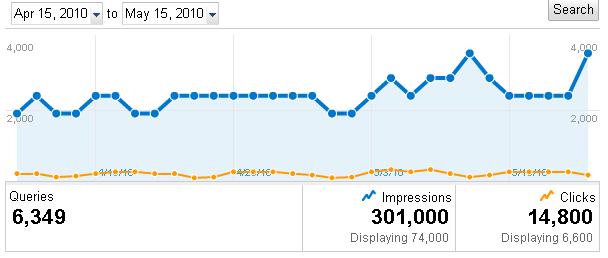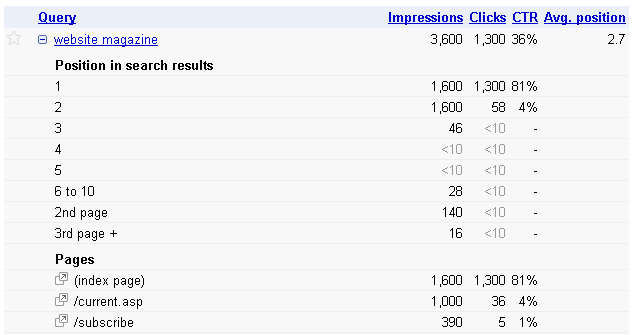Organic Click-Through Rate Rules

 Google Analytics has changed the game for SEO's looking to understand their performance with it's new Search Queries report. While ranking position has been the sole measure of SEO success for as long as many can remember, the focus has shifted to "organic click-through" and it provides a more meaningful, although for some slightly terrifying, glimpse into achievement.
Google Analytics has changed the game for SEO's looking to understand their performance with it's new Search Queries report. While ranking position has been the sole measure of SEO success for as long as many can remember, the focus has shifted to "organic click-through" and it provides a more meaningful, although for some slightly terrifying, glimpse into achievement.
It is not uncommon to hear from proud Web professionals that they, after months or years of optimization, have finally achieved a first place ranking. What many ultimately discover to their own befuddled amazement is that oftentimes those keywords that they now rank for simply do not convert.
In today's world of digital media optimization, the quantity of traffic is all but meaningless. What is more important is quality of traffic that you receive. The SEO mavens of our time realize the importance of keyword research but understand that SEO does not stop there (or at a first place ranking). They understand the quality of their traffic as well. They know which terms convert and which they should avoid.
The sole way to determine the quality of traffic should come as no surprise if you are familiar with analytics on any level. Bounce rate is clearly a good indicator but conversion rate metrics (something you should most definitely be tracking through your analytics vendor) indicate performance far better. There is an even more effective way to determine if you've made the right decision and are getting closer to your ultimate goal of total SERP domination - organic click-through rate.
Much in the same way that search advertising services provide an equivalent indication for paid listings (multiplying the number of impressions versus the number of clicks), those responsible for SEO success should consider adopting this same key performance indicator.
While your analytics account will not offer this information, users of Google Webmaster Tools do have access to it through the recently released Search Queries report. For many SEO's it will be considered the ultimate mechanism to determine performance. If you're not using Google Webmaster Tools, stop reading, sign up (for free) and hang on for a wild ride as the information you'll receive will be well worth your time investment (which is minimal at best).

As you can see from the image above, the report in GWT provides data on the total number of impressions, the total number of clicks, the click-through rate/ratio and the average position per keyword. If you think that's valuable information, it gets even better. Not only can you determine your overall organic click-through rate, but you are also able to drill down and obtain information for each keyword including impressions, click and click-through rate for each position and for each entry page. Ready for more - you can even segment by platform and determine search performance for Web, mobile and even images.

The value of tracking organic click-through rate site-wide and per keyword will prove to be your most valuable indicator of performance. For perhaps the first time, SEO's will be able to identify keywords that are performing well on the SERP's and those that are not. This information could be turned over to our landing page optimization team, copywriters and even business development teams to make enterprise level decisions on optimization, marketing and more. That's a KPI you can get excited about as it fully involves every aspect of the organization in its ultimate success.

Subscribe to Our Newsletter!
Latest in Marketing







